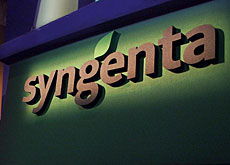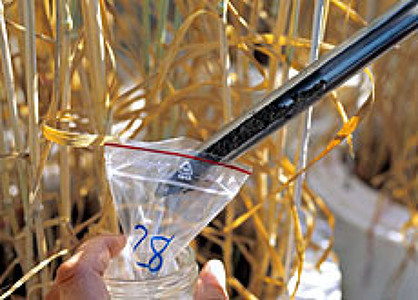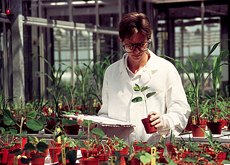Syngenta denies illegal GMO tests in Brazil

Swiss agrochemicals giant Syngenta has denied claims that its experiments with genetically modified organisms (GMOs) at a farm in Brazil are illegal.
The test site in the south of the country has been invaded by hundreds of peasant activists who claim the company has illegally planted transgenic seeds close to a nature reserve.
The Basel-based company told swissinfo on Friday that around 300 peasant activists were still occupying the farm in Parana state but had been given five days to leave by the Brazilian authorities.
Spokesman Guy Wolff strongly refuted the claims made by La Via Campesina, an international group allied with Brazil’s militant Landless Peasants’ Movement.
“We deny this 100 per cent. A company like Syngenta would not start playing tricks like that, it is just against our policy. We are being scrutinised very closely,” said Wolff.
“In any case we have government authorisation for what we do there. It’s a test site for transgenic soya bean and corn, and we have all the legal permits to do that.”
Via Campesina, which claims around 1,000 small farmers and peasants are occupying the site, said in a statement that an inspection this month by Brazil’s environmental agency Ibama found GMO seeds planted closer to the Iguaçu National Park than permitted by law.
Transgenic seeds
An Ibama spokesman confirmed to Reuters that 30 acres of Syngenta’s transgenic soy plantings were about six kilometres from the park, while the permitted distance is ten kilometres.
Syngenta said it was surprised by the environment agency’s statement and said it was complying with regulations laid down by Brazil’s National Technical Commission for Biosecurity.
“This is hard to believe,” commented Wolff. “We are ten kilometers away from the park and anyway the pollen would certainly not travel further than ten or 20 yards. We are absolutely within the legal frame.”
Roberto Baggio, a coordinator for the Landless Peasants’ Movement, told Reuters that small farmers and peasants wanted the government to intensify biosecurity checks around the Iguaçu park.
“They believe that the only way out is to cut short the experiments definitively and bar Syngenta from occupying the property [near the park],” he said.
Land invasions are common in Brazil, mainly to demand that the government speed up the distribution of public land for settlement of poor peasants.
Last week about 2,000 Via Campesina members invaded a southern Brazil plantation owned by paper and pulp company Aracruz Celulose, destroying a million saplings and damaging a research laboratory.
swissinfo with agencies
Basel-based Syngenta is a world leader in crop protection and ranks third in the high-value commercial seeds market.
The company reported strong profit growth for 2005 – up 25% to $779 million (SFr 1 billion).
Sales were approximately $8.1 billion.
Syngenta employs more than 19,000 people in over 90 countries.
The occupation of the Syngenta farm occurred as delegates from dozens of countries arrived for a United Nations-sponsored international biosafety conference in Curitiba, the capital of Parana state.
Delegates are discussing the Protocol of Cartagena, a 2003 agreement signed by 132 nations dealing with the transport, handling and use of GMOs.
The protocol also establishes rules for international commerce involving these products.

In compliance with the JTI standards
More: SWI swissinfo.ch certified by the Journalism Trust Initiative


You can find an overview of ongoing debates with our journalists here. Please join us!
If you want to start a conversation about a topic raised in this article or want to report factual errors, email us at english@swissinfo.ch.